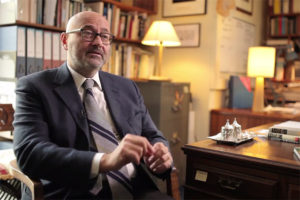Renaissance Maps of Paradise
Historian Alessandro Scafi on the four rivers of paradise, Calvin's mapping of Eden, and the first attempts to...
What were the consequences of abandoning the international gold standard? How can we restore the reliability of money? What was the best case of a private banking system? These and other questions are answered the Professor of Economics at George Mason University Lawrence H. White.
A lot of people think that since they see pictures of dead politicians on their money that it’s always been produced by government and that’s the only way it can be. But I’ll talk about the history of the privately issued money because actually the first coins we know about were issued by private merchants who wanted to improve the purity and the consistency of the pieces of metal that people were trading with.
Similarly this first paper money, these first banknotes were introduced by private bankers who were actually offering improvement. At that point in Medieval Italy the coinage function had been taken over by governments. It had been taken over not to improve the quality, but actually the reverse in order to tax the currency by debasing it, by squeezing the silver out of it and making cheaper and cheaper coins, so it will profit the princes.
The private bankers came in and offered money that was denominated in pure units of silver and made it transferable through bank accounts, so merchants didn’t have to worry about handling big bags of coins, whose quality was unreliable. And of course paper notes became much more portable, much more convenient – substitute for logging around big bags of coins. It’s been private enterprise that has improved the quality of money and made it easier to transfer money.
There was a period of the International Gold Standard in which the basic money traded internationally consisted of gold and silver coins. Some places were monopolized by government, but the governments had to compete, at least, in the international market; and so the money was reliable. The Gold Standard didn’t rely on any one government. One government could leave the Gold Standard but the other countries would continue. So the International Gold Standard would continue to operate. It didn’t rely on the trustworthiness of any particular government. That made it possible to have an International Standard that people could trust because nobody was in a position to debase it.
In the WWI, 1914-1918, the governments of Europe, all went off the Gold Standards, started issuing paper money in vast quantities and the Gold Standard never really recovered. Since then we’ve had the problem of unrestricted government issue of money, which has given us bouts of high inflation, hyperinflation in some countries, chronic inflation in other countries. One of the best hopes we have for reintroducing reliable money would be to try to find a way to return competition and contract and trustworthiness to the monetary system.
Another possibility is the new technology known as cryptocurrency. Gold and silver worked by privately issued money being redeemable, that is, the bank would promise to buy back your banknote for a fixed sum in gold or silver. So many ounces of gold or so many ounces of silver. So it was a price guarantee, you might say.
Bitcoin works in entirely different way. It has a quantity guarantee. There is a program that generates the number of Bitcoins out into the future. And anyone can view the program – it’s open source, anyone can inspect it. Anyone can look at the chain of transactions that’s already been logged. So it’s verifiable in that way but Bitcoin works by guaranteeing that only so many Bitcoins will be issued at any point time. That way people can rely on it not to hyperinflate. There is not anybody who controls the quantity – it’s controlled by this program.
The problem with Bitcoin is that, therefore, when the demand that goes up and down, the value goes up and down because the quantity is predetermined. That works against it being widely adapted as a medium of exchange. If we don’t go back to a commodity standard and if we face this difficulty, to have crypto currencies is more widely adapted because of the variability of the value, we are left with trying to figure out the way to control the issue of money by central banks. So that’s the challenge of our time to devise or invent, to write down some kind of constraint that will give people some trustworthiness.
The last great experiment in writing a Constitution for fiat money was the European Central Bank Constitution. It was basically written by the Germans who said ‘we are not going to participate unless we get a guarantee’, that the one goal of the European Central Bank will be price stability – maintain the value of the Euro. And we put that in the Constitution. And one of the first acts, by-laws, adapted by the European Central Bank was to define price stability as inflation less than two per cent. That was the rule and it was very solid currency, it quickly rose to a premium over the US Dollar. But now that Constitution is not being obeyed, the European Central Bank is not just fixing on the goal of maintaining the value of the money. They are trying to rescue Greece. They are trying to backstab the banking system. They are taking on all kinds of missions that run into conflict with the original mission. That’s a disappointment and that makes me think that we cannot really rely on governments to maintain their promises. We need some kind of contractual mechanism, some kind of private mechanism, where if the issue of money doesn’t live up to the contract, they can be taken to a quote of law. We should have a monetary standard whose value doesn’t rely on one big actor continuing to play by the rules that actor has set. That is the Central Bank. We shouldn’t have to rely on central banks.
To get away from them as I said we need to make a transition to some other kind of money. In the meantime it seems to be important that we defend the principle that people have the freedom to choose whatever currency they want to use among those that are available. So people in any country should be free to use the money issued in any other country. People should be free to use gold or silver. People should be free to use Bitcoin or other cryptocurrencies.
One of the most interesting experiences with the private banking system, or free banking system, I like to call it… that is what proponents call it, by contrast to a centralized banking system, a free banking system meaning free entry, free competition, no artificial legal restrictions on the kinds of contracts banks can make with their customers, no monopoly privileges for one bank of issue, which was the historical origin of central banks. One of the best cases we have with that kind of system operating was in Scotland – this is what I’ve done research on studied for the last 30 years – where anybody could start a bank, anybody who would accept responsibilities, so the bankers had what lawyers call unlimited liability for the debts created by the banking company. Which meant that if they didn’t pay back, they are noteholders or they didn’t pay back their depositors, all the property of the shareholders in the bank was now the property of the debtors of the bank, of the noteholders and the depositors of the bank – I should say, the creditors of the bank. That made banks behave very prudently, very responsibly. It meant that if a bank was starting to become unprofitable, unlike today the owners under that system did not have a reason to say, ‘well, the time to start taking crazy risks, because we can’t lose anymore’. That’s the problem of the system we have today. Under unlimited liability the owners say: “let’s close the bank and pay everybody in to just wind up the business, because we don’t want to pile up more and more obligations”.
So in the Scottish system there were more than two dozen banks issuing banknotes. They were all redeemable in a silver pound sterling. All the notes of different banks traded against one another, one to one, at par value, at a hundred cents on the pound; two hundred forty shillings in the pound. There weren’t floating exchanges between banks. It was a unified monetary system. So banks would accept notes issued by other banks. They would accept cheques written on other banks. They would get together and exchange these obligations at the clearing house. And that provided a regular system discipline to keep any bank from issuing more money than its customers wanted to hold. So no bank was in a position to overissue, and the system regulated itself, it regulated the quantity of money through this competitive mechanism, not through any plan from the center, not through any artificial rule fastened on a political institution, but through this market mechanism. People who had more money than they wanted could take it back to the bank and turn it in for gold or silver.
The system as a whole was pinned down by the International Gold Standard. If all the banks together would issue too much money or, more likely, if for some reason people in Scotland wanted to hold less money, money would flow out of the system, and that would compel the banks to pole back the amount they had in circulation.
But that was an inspiration for a lot of reformers in the 19th century to introduce Scottish-style banking systems around the world. There were more than 60 places in the world in the 19th century where you had competition among different private issuers of currency. And it worked wherever the government would let it work. Wherever a competition was allowed, no privileges given to special banks.
If free banking was so good why didn’t it last? It didn’t last because the governments wanted the revenue available from having a monopoly on issuing currency. Just like private coinage didn’t last because the governments wanted the revenue available from having monopoly on the. So it was really a fiscal story in most places. So that led us to a current system where we have to hope and wish that our government won’t ruin the currency. But some governments have been very poorly behaved. And even in countries where the government have been relatively well-behaved, and I would count the USA as one of those, we’ve had periods of double-digit inflation, and there is no guarantee that we won’t have them again. It’s true that central banks have been more responsible in the last 15 years than they were before, but there is nothing to guarantee that when they find themselves deeply in debt they won’t want to just print the money to pay back the debts and then ruin the currency.

Historian Alessandro Scafi on the four rivers of paradise, Calvin's mapping of Eden, and the first attempts to...

Neuroscientist Michael Thomas on children's environment, the influence of poverty on the brain, and ADHD

Historian Elena Brown on rivalries between the White Rose and the Red Rose, and the heraldic badges of the Eng...